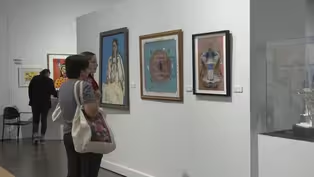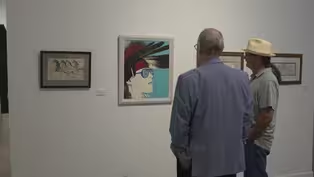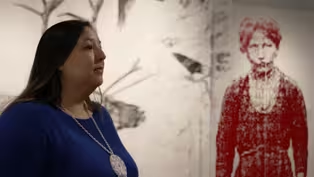
Frieda's Cafe
Clip: Season 15 Episode 5 | 10m 1sVideo has Closed Captions
Frieda's Cafe in Willmar began as a WWII refugee story and continues to serve.
Frieda's Cafe in Willmar began as a WWII refugee story and continues to serve the community today. Deb Rodelius, the daughter of Frieda, currently owns and operates Freida’s Cafe.
Problems playing video? | Closed Captioning Feedback
Problems playing video? | Closed Captioning Feedback
Postcards is a local public television program presented by Pioneer PBS
Production sponsorship is provided by contributions from the voters of Minnesota through a legislative appropriation from the Arts and Cultural Heritage Fund, Explore Alexandria Tourism, Shalom Hill Farm, West Central...

Frieda's Cafe
Clip: Season 15 Episode 5 | 10m 1sVideo has Closed Captions
Frieda's Cafe in Willmar began as a WWII refugee story and continues to serve the community today. Deb Rodelius, the daughter of Frieda, currently owns and operates Freida’s Cafe.
Problems playing video? | Closed Captioning Feedback
How to Watch Postcards
Postcards is available to stream on pbs.org and the free PBS App, available on iPhone, Apple TV, Android TV, Android smartphones, Amazon Fire TV, Amazon Fire Tablet, Roku, Samsung Smart TV, and Vizio.
Providing Support for PBS.org
Learn Moreabout PBS online sponsorship(people murmuring) (burgers sizzling) (uptempo cheery music) - Thank you.
- You're welcome.
- Nobody ever wrote down anybody's order.
You just took it, and you gave it to my mom, and she probably had eight, 10 more orders going on, she'd add your order to that.
All of us waitresses once in a while we'd be like, "Okay, where did this go again?"
And my mom would say, "Table four (laughs)."
She had her back to us, and she still knew where it came from.
(uptempo cheery music) (car engine roaring) Frieda's is a small cafe in Downtown Willmar, and it's been in existence with the name Frieda's Cafe since the 1970s.
My mom owned it, and it was named after her, but my grandmother worked there.
My dad came in and helped with the till during the really busy times.
My brother helped with that.
And of course, I waitressed.
(slow somber music) My mom was born in Prussia, which is now part of Poland, but it was part of Germany back when she was born and when she was eight years old, World War II started, and my grandfather had no choice.
He got drafted into the army, but he and his troop found themselves surrounded by Russians on one side and Americans on the other, and they just surrendered to the Americans.
That left my mom and my grandma on their own.
(tense dramatic music) As the Russians were advancing.
She and my mom, they were in a whole big line of refugees that were crossing a frozen lake.
Russia came over and started dropping bombs on 'em.
And so my grandma tells me how she just threw herself on top of my mom and hope and prayed that they would make it through this bombing.
After the war was done, it took them three years, and the help of the Red Cross to get in contact again with my grandpa.
My grandma had a brother, Uncle Max, who lived on a farm up by Benson, and he said, "I could use help on the farm.
Why don't you come here?"
My mom didn't speak any English at the time, but she learned English, and then she met my dad maybe about six months or so after, they came here, and they were married in 1955.
(slow somber music) My mom, my grandmother, my grandfather, and the funny thing about this picture is this is my dad's mom and my dad's brother.
They didn't know each other yet.
They were at that "Welcome to America" party that they put on at the church.
(uptempo cheery music) That's my mom, and this is my grandmother doing her dishwasher duty.
(uptempo cheery music) I had to laugh when I was looking through some of the old articles from the newspaper.
They had the old Benson Avenue where the cafe is located, all dug up and mud on the sidewalks, and all that kind of stuff.
Within a day, the city crew came in, and put gravel in there or something.
And I just had to laugh because I am thinking these guys just want their breakfast, they wanna be able to get in there.
If there was a blizzard, my mom couldn't get out of her driveway, and they kind of figured she couldn't.
They'd go get her at three o'clock in the morning and bring her to the cafe.
(uptempo cheery music) - She was one hardworking gal, and good food all the time, just like now, you know, it hasn't changed a bit in years.
(uptempo cheery music) - [Deb] So my mom sold it to my husband's nephew and his wife.
So it's still in the family, it just flopped sides.
- We were a young couple, and we decided we wanted to work for ourselves, be our own boss.
So my husband decided he would come ask Frieda just straight up, come ask her, "can we buy the restaurant from you?"
And Frieda said, "No, absolutely not."
So my husband said, "Okay, if you change your mind, just let us know."
Six months later, she made the phone call.
I think I was 23 and Steve was 24.
(slow relaxing music) Frieda was, you didn't really wanna mess with her, you know, she kind of was very black and white, and she had a job to do, and that's what she wanted to do, but in a very nice, kind way away.
- Her coffee was 10 cents a cup.
She refused to raise that.
She got a phone call from another person that ran a cafe or a restaurant or whatever in town, and he told her that she had to raise her prices.
And so my mom being naive and being from Germany, she comes home and tells us this, and we're all like, "Nope, you can do whatever you want.
They can't tell you what you have to do."
So she never raised the prices.
It was always 10 cents for a cup of coffee.
- Life is hard and I just wanna have a nice place for families to come and not feel stressed about a high bill.
And that's what Frieda always wanted too.
And she said, "We gotta have a niche.
And her niche was dime coffee, get the people through the door for a dime coffee.
And we kept it at a dime for maybe five years, but then we jumped it up to 50 cents, and we've kept it there since.
(people murmuring) (slow relaxing music) You know, it's the Frieda's family, and we're, come on in, you're fine.
Come on in.
- Okay.
- No troubles.
So, you know, I've been known if a customer doesn't show up for one day or two days, I will go to that customer's house.
I'll knock on the door, and make sure that customer is okay.
So it's more than just coming in to eat.
- [Customer 1] My boy has a.
(food sizzling) - Best place in town.
Come here and eat and we shake dice at 2:30 for coffee.
(machine whirring) - [Customer 2] I like the homey atmosphere personally, but the food is great.
Pretty much all of it's homemade.
- I flew in to come visit him, and I heard of the place from him.
Absolutely, probably the best food I've ever tasted.
- I would agree with that, I love it here.
- Well, I've been coming here for, I'll bet you 80 years.
The counter was over here when I first started coming, we used to come early in the morning, and she'd let us in the back door (chuckles).
- It's hard, hard work, but the people are what make it fun.
Coming to work every day, and seeing the people, and seeing how much they love coming to Frieda's is what makes your heart happy, and that's what I have on the back of my shirt, "Your happy place."
(slow poignant music) - There were many older gentlemen, mostly, that would come to the cafe for all their meals, and at Christmas or at Thanksgiving, she would invite them to our home for Christmas dinner meal or Thanksgiving meal, so we shared the table with many of her customers every holiday.
I always thought that was very kind of her to do that.
(slow poignant music) I think my mom would be very happy and very proud of the fact that her name is still on that cafe.
Steve and Amy have done a fabulous job with it.
So I know my mom is looking down and is very happy about that.
(slow poignant music) - Love you, bye.
- Love you, bye, bye.
(uptempo electronic music) - [Announcer] "Postcards" is made possible by the Minnesota Arts and Cultural Heritage Fund and the citizens of Minnesota.
Additional support provided by Margaret A. Cargill Philanthropies, Mark and Margaret Yackel-Juleen on behalf of Shalom Hill Farms, a retreat and conference center in a prairie setting near Windom, Minnesota.
On the web at shalomhillfarm.org.
Alexandria, Minnesota, a year-round destination with hundreds of lakes, trails.
and attractions for memorable vacations and events.
More information at explorealex.com, the Lake Region Arts Councils Arts Calendar, an arts and cultural heritage funded digital calendar, showcasing upcoming art events and opportunities for artists in West Central Minnesota.
On the web at lrac4calendar.org.
Playing today's new music plus your favorite hits, 96 7 CRA.
Online at ninetysixseven.com.
(upbeat music)
Community Cafe, Artist, Art Exhibit
Preview: S15 Ep5 | 40s | Frieda's Cafe; honoring Oscar Howe w/ artist Wicanhpi Iyotan Win; and a joint art exhibit. (40s)
Honoring Howe: Legacy of Stories
Video has Closed Captions
Clip: S15 Ep5 | 9m 32s | Wicanhpi Iyotan Win (Autumn Cavender) talks about the legacy of artist Oscar Howe. (9m 32s)
Video has Closed Captions
Clip: S15 Ep5 | 11m 11s | The American Swedish Institute & All My Relations Arts present an art exhibit. (11m 11s)
Providing Support for PBS.org
Learn Moreabout PBS online sponsorshipSupport for PBS provided by:
























